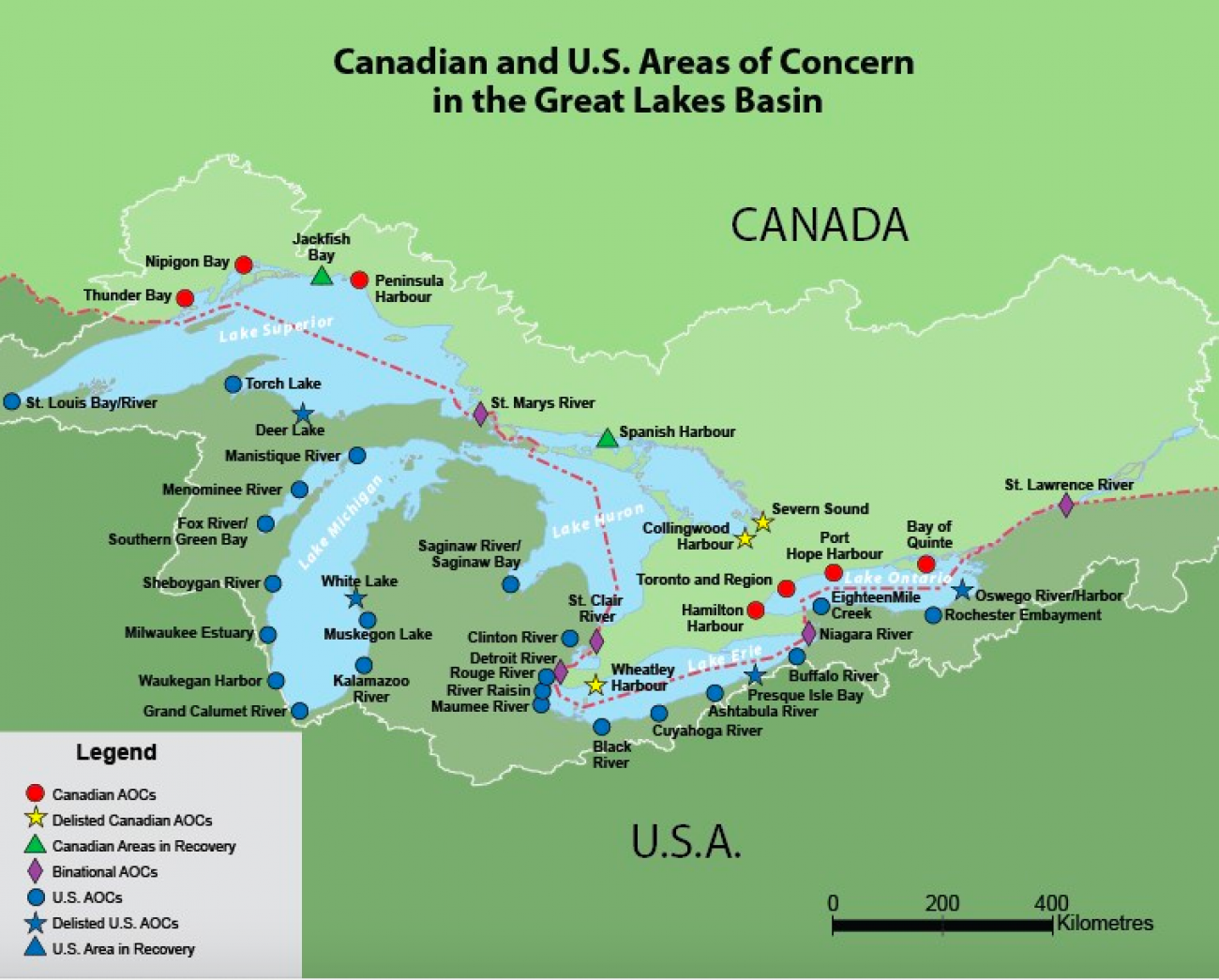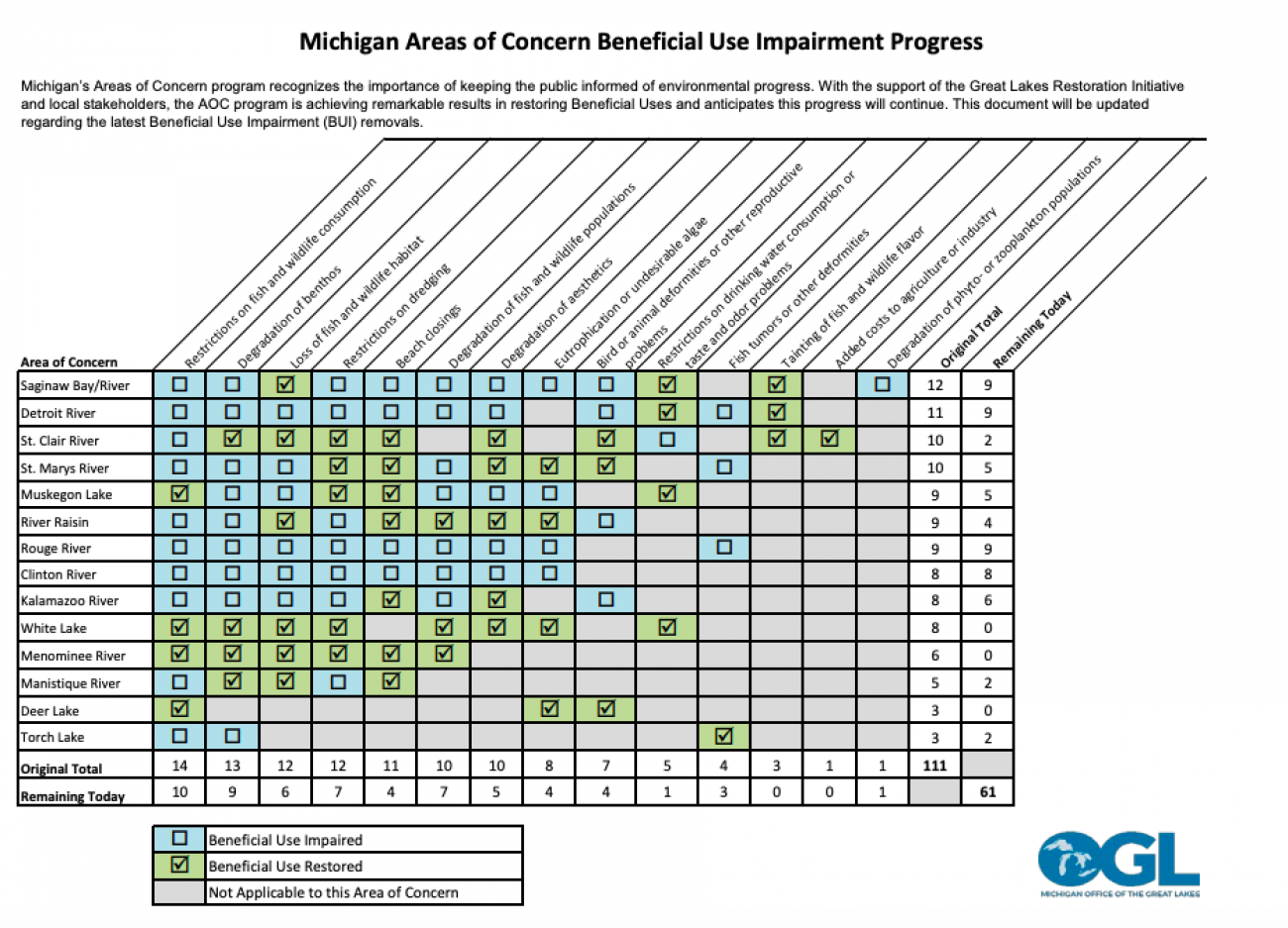Audit: Michigan Office of the Great Lakes didn't keep track of money

LANSING — Michigan’s Office of the Great Lakes broke federal grant-writing rules, failed to keep track of money and hasn’t updated some plans to clean polluted sites in years, according to an audit published Friday.
Michigan’s auditor general, Doug Ringler, examined how the office charged with protecting and restoring Michigan’s Great Lakes works with universities, nonprofits and others to remove contaminants and restore wildlife habitats in 14 “areas of concern” — lakes and rivers facing heavy pollution from industry and other development.

Ringler found the program, which doled out $10.4 million in grants from 2016 to 2017, “moderately effective.” He flagged a litany of deficiencies but did not list some specifics about grants, including parties involved. The audit found:
- The Office of Great Lakes awarded one unnamed university a $328,000 grant through an informal, poorly documented process that lacked a work plan. The office “could not assess whether a grant agreement met its needs.” The grantee created two classes to teach graduate students about the pollution program and its public outreach.
- The office failed to comply with federal and state grant requirements, prompting the state to issue $13,667 in unallowable or unsupported costs — such sponsorship of a watershed festival, including advertising and charter boat trips. The office accepted financial and program reports from six grantees weeks and even months past deadlines.
- The office seldom updated “remedial action plans” for the polluted sites despite vowing to do so in agreements with the U.S. Environmental Protection Agency.
- The office hadn’t updated its plan for remediating Houghton County’s Torch Lake since 2007, and it hadn’t updated plans for the Detroit River, St. Clair River and Rouge River since 2008. The lack of updates limits the public’s involvement in efforts to clean up those sites and delist them from the program, the audit found.
- The office did not consistently notify the public about its removal of certain restrictions on waters in the program as conditions improved — including those related to dredging or eating fish and wildlife, for example.

Related Great Lakes stories:
- Rising waters of Lake Michigan assault Grand Traverse coast. In photos
- Surging Great Lakes threaten Michigan’s beloved Fishtown
- Commercial fishing is sinking fast in Michigan. Time for more regulations?
- Surging Great Lakes water levels shrink beaches, flood docks in Michigan
- Opinion | Climate change drives shifts between high, low Great Lakes water levels
- Michigan environment roundup: Great Lakes water levels could break records
The Office of Great Lakes receives funding for the Areas of Concern Program through an agreement with the EPA.
The Michigan Department of Environment, Great Lakes and Energy (EGLE) absorbed the office when Gov. Gretchen Whitmer reshaped the environmental agency this year. But the office has bounced around state government over the years. The Department of Natural Resources housed the office from 2017 through early 2019 after the Department of Environmental Quality — EGLE’s predecessor — oversaw the office for the seven years before that.
EGLE officials told Ringler the agency would take steps to address the issues — including bolstering controls on program funds, documenting procedures and improving communication with community groups.
“EGLE agrees that effective use of grant funding is essential,” the agency wrote, according to Ringler’s audit.
EGLE told Bridge Magazine that the agency welcomed the auditor’s “thorough review.”
“With the recent transition of the Office of the Great Lakes back to EGLE, the realignment of the [Office of the Great Lakes] and EGLE Water Resources Division will enhance the department's ability to protect and restore Michigan's waters,” Nick Assendelft, an agency spokesman, said in an email. “It will also assure that proper program controls recommended by the Office of Auditor General are implemented in the future.”
The U.S. and Canada created the Great Lakes Areas of Concern following a 1987 agreement that flagged 43 heavily polluted sites in need of restoration — 14 of them in Michigan.
The state has since delisted two of those sites in 2014: Deer Lake in Marquette County and White Lake in Muskegon County, citing improvements to wildlife habitats and water quality. Ringler’s audit found the Office of Great Lakes properly followed its guidance in removing those sites from the list. Delistings don’t mean a site has been restored to pristine condition, but they indicate the most serious pollution is gone.
In a recent document, the Office of the Great Lakes says the Areas of Concern program “is achieving remarkable results in restoring [usage of the waters] and anticipates this progress will continue.”
Michigan Environment Watch
Michigan Environment Watch examines how public policy, industry, and other factors interact with the state’s trove of natural resources.
- See full coverage
- Subscribe
- Share tips and questions with Bridge environment reporter Kelly House
Michigan Environment Watch is made possible by generous financial support from:
Our generous Environment Watch underwriters encourage Bridge Michigan readers to also support civic journalism by becoming Bridge members. Please consider joining today.
See what new members are saying about why they donated to Bridge Michigan:
- “In order for this information to be accurate and unbiased it must be underwritten by its readers, not by special interests.” - Larry S.
- “Not many other media sources report on the topics Bridge does.” - Susan B.
- “Your journalism is outstanding and rare these days.” - Mark S.
If you want to ensure the future of nonpartisan, nonprofit Michigan journalism, please become a member today. You, too, will be asked why you donated and maybe we'll feature your quote next time!






